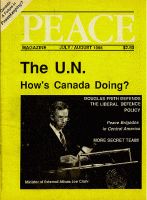
Peace Magazine Aug-Sep 1988, page 24. Some rights reserved.
Search for other articles by Jeff de Freitas here
Canadian Peace Alliance meets in Ottawa
Delegates representing over 400 peace groups across Canada converged on Ottawa in June for the Third Annual Canadian Peace Alliance (CPA) convention. The convention, under the theme "Electing Peace!", brought together the diversity of the peace movement in this country, as well as the full range of peace movement concerns -- such as Canada's White Paper on Defence, NATO and NORAD involvement, warship visits, low level flight tests in Canada, and cruise missile testing.
The CPA is a link for the peace movement, disseminating information, organizing campaigns and speaker tours for its member groups. The largest undertaking of the CPA is the Canadian Peace Pledge Campaign, which is designed to bring peace issues to the forefront in the next federal election. It is supported by member groups across the country. The aim is to collect signatures from Canadians vowing to vote only for candidates who are willing to take a positive stance on fundamental peace issues.
Keynote speakers at the conference included Australian Senator Jo Valentine. An independent who ran solely on peace issues, she considers herself a peace activist, then a politician. She urged Canada to cut ties with NATO and to "develop defensive defence using non-military measures."
Senator Valentine drew many comparisons between Australia and Canada. Both countries have very close ties with the United States ; experience visits from American nuclear powered, nuclear armed warships; are in the uranium production and export business, which contributes to the global nuclear fuel chain; and both countries mistreat their native peoples. "We cannot have peace without justice," she said.
Also addressing the delegation on behalf of the Japan Council Against A and H Bombs was Mitsuo Kojima. He presented the conference with the Hiroshima-Nagasaki Flame which was also presented to UNSSOD III (United Nations Special Sessions on Disarmament) in New York. While in New York and Ottawa he promoted the group's latest effort, Appeal from Hiroshima and Nagasaki. The Appeal is a signature campaign, which asks citizens of Japan to call for the total elimination of nuclear weapons worldwide. The campaign has gathered three million signatures in Japan, including 60 percent of all mayors in the country. The goal is to obtain one billion signatures, worldwide.
The convention also saw the delegates strengthen their commitment to the youth in the peace movement. The Youth Caucus brought forth a resolution to the members which called for the CPA to set aside $5,000 expressly to aid the youth groups across the country in networking, and promoting their recruitment. The CPA is also committed to establishing a youth liaison to assist these groups, as well as encourage and promote activities of the youth movement in the country.
The member groups agreed to give national support to another campaign initiated by North Atlantic Peace Organization (NAPO) in an effort to stop low-level flight tests in Canada in the Maritime region, and to protest the establishment of a NATO base in Goose Bay, Labrador.
The most productive activity to come out the four-day conference was a day of lobbying on Parliament Hill. Delegates to the convention met with the leaders of both opposition parties and with Defence Minister Beatty .
In their session the NDP reiterated their intention to strive for Canada's becoming a nuclear weapons free zone; to place a moratorium on visits from nuclear-powered, nuclear-armed warships; and to oppose the purchase of nuclear submarines and Canadian involvement in the Star Wars project. NDP Leader Ed Broadbent called the White paper on Defence an "abysmal document." He stated that an NDP government would return Canada to a leading peacekeeping nation, although under the NDP, Canada would increase defence spending but, "away from alliance defences and concentrate on building a common security framework."
Liberal leader John Turner said his party is willing to make peace a priority issue. Turner disagreed with the NDP policy of neutrality, saying that the Liberals will maintain Canada's membership in both NATO and NORAD and become a more active participant in their discussions.
The Liberals also are opposed to the purchase of nuclear submarines, and is committed to ending cruise missile testing in Canada, to the elimination of sea-based cruise missiles (which the INF agreement doesn't cover), to initiating discussions with Nordic nations to pursue a multilateral treaty for the demilitarization of the Arctic, and to pursuing a seat on the U.N. Security Council. When asked whether the Liberal Party would push for Canada to become a nuclear weapons free zone, Mr. Turner was a little evasive, saying that demilitarization of the Arctic is more important and that the Liberals would encourage other nations to participate before committing Canada to a nuclear-free stance.
For their part, the Conservatives were less interested in meeting the delegates. Originally they had scheduled Associate Defense Minister Paul Dick as their only representative, but at the last moment Perrin Beatty met with the delegation.
The Defence Minister denied that the acquisition of the submarines was in direct contravention of the Non-Proliferation Treaty, saying the uranium to be used in the subs is not weapons grade and therefore falls safely within the limits of the treaty. There did seem to be some uncertainty with regard to disposal of the waste created by spent fuel from the subs. The Conservatives lack a policy on this matter.
Most of the delegates felt the weekend had given cause to celebrate the growth of the peace movement. As Jo Valentine said, "the task ahead is enormous, but not impossible."
The last order of business was to pass the Hiroshima-Nagasaki Flame from the Ottawa Organizing Committee to the newly-founded Prairie Rednecks for Peace, who have volunteered to host the next CPA conference in Alberta. p
Jeff de Freitas is an Assistant Editor of PEACE.

Peace Magazine Aug-Sep 1988, page 24. Some rights reserved.
Search for other articles by Jeff de Freitas here